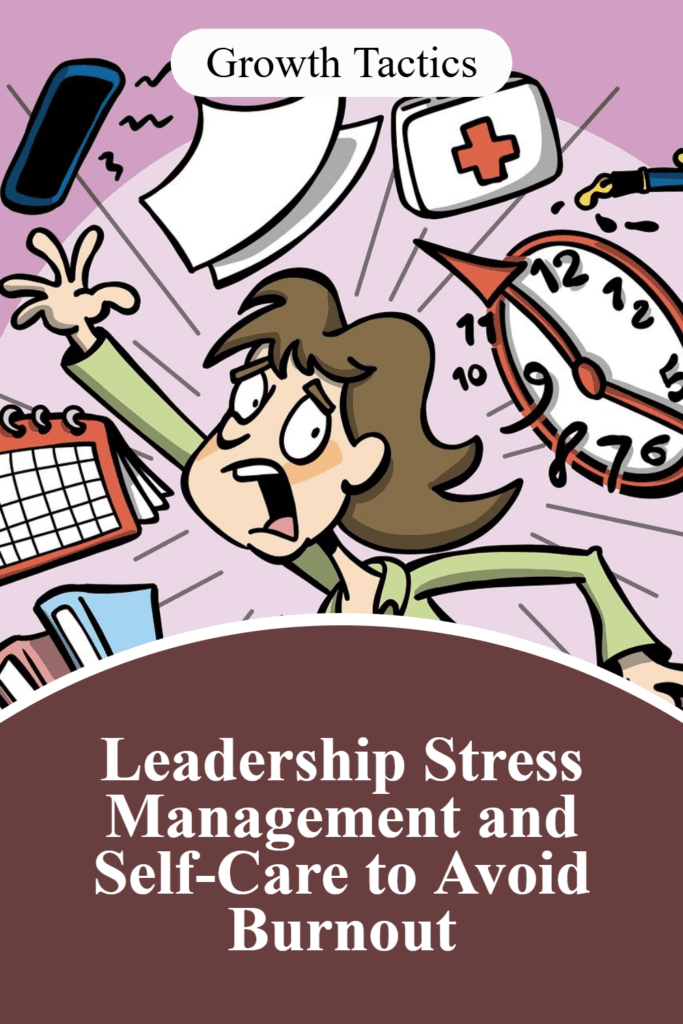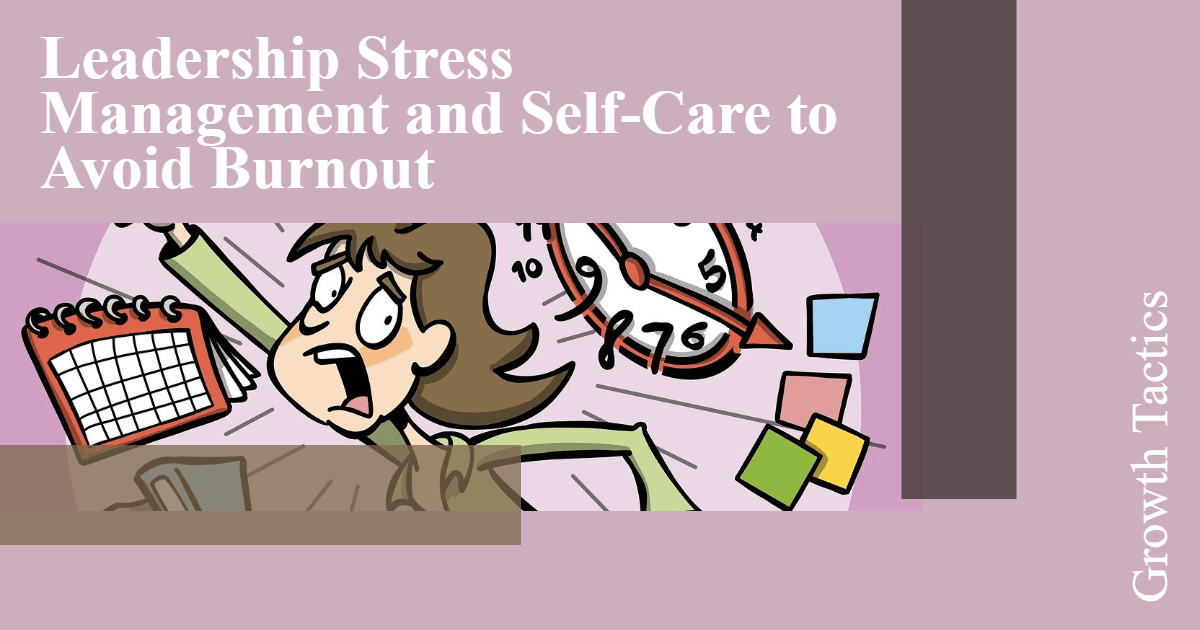I’ve been there, juggling a million tasks, feeling the weight of responsibility, and wondering if I’ll ever catch a break.
Sound familiar?
Well, I’ve got news for you: burnout isn’t a badge of honor, and it’s definitely not a requirement for success. In fact, taking care of yourself is the secret sauce to becoming an even better leader. So, let’s dive into some simple, effective ways to manage your leadership stress and keep your fire burning bright.
Jump To Section
What are the common sources of stress for leaders?
Let’s face it, being a leader isn’t always a walk in the park. Stress comes at us from all angles. Sometimes it feels like we’re juggling flaming torches while riding a unicycle!
From my experience, the big stress-makers are usually:
- Making tough decisions
- Carrying heavy responsibilities
- Dealing with conflicting priorities
- Managing people and their expectations
But don’t worry, we’re going to break these down and find ways to handle them.
How does decision-making contribute to leadership stress?
Oh boy, decision-making. It’s a biggie when it comes to stress. I remember when I had to choose between two great candidates for a promotion. Talk about pressure!
Here’s the thing: every choice we make can have a big impact. It’s like we’re playing chess, but the pieces are real people and projects. No wonder it keeps us up at night!
But here’s a tip: trust your gut. You’re in your position for a reason. Make the best decision you can with the info you have. And remember, it’s okay to ask for input. You don’t have to go it alone.
What role does responsibility play in increasing stress levels?
Responsibility is like a backpack. The higher up you go, the more stuff gets added to it. And boy, can it get heavy!
I used to feel like I had the weight of the world on my shoulders (I still do at times). Every team success (or failure) felt like it was all on me. Sound familiar?
Here’s what helped me: remember that you’re part of a team. Yes, you’re responsible, but you’re not alone. Delegate when you can. Trust your people. It’s not just good for you, it helps them grow too!
How do conflicting priorities impact leader stress?
Ah, conflicting priorities. It’s like being pulled in a million directions at once. Been there, done that!
One minute you’re focused on a long-term project, the next there’s an urgent email demanding your attention. It’s enough to make your head spin!
Here’s what works for me: take a step back. Breathe. Ask yourself, “What’s the most important thing right now?” Focus on that. The rest can wait.
Remember, you can’t do everything at once, and that’s okay. Prioritize based on your purpose and values. It’ll help you cut through the noise and focus on what really matters.
How can leaders recognize the warning signs of stress and burnout?
In this section, we’ll explore the physical, emotional, and behavioral red flags that scream “Hey, leader! You’re stressed!” I’ll share some of my own experiences, and we’ll look at common warning signs together. Remember, recognizing stress is the first step to beating it. So, let’s dive in and learn how to listen to what our bodies and behaviors are telling us.
What are the physical warning signs of stress in leaders?
Our bodies are pretty smart. They tell us when something’s off, but are we listening? I wasn’t listening until I found myself with constant headaches and an upset stomach.
Here are some common physical signs:
- Trouble sleeping (tossing and turning, anyone?)
- Frequent headaches or muscle tension
- Changes in appetite (stress eating is real!)
- Feeling tired all the time
If you’re nodding along, it might be time to check in with yourself. Your body’s trying to tell you something!
How does stress affect a leader’s emotional well-being?
Emotions are tricky, aren’t they? When stress creeps in, it can turn our feelings upside down. I remember snapping at my team over small things and feeling guilty afterward.
Watch out for:
- Feeling irritable or short-tempered
- Anxiety or constant worry
- Lack of motivation (even for things you usually love)
- Feeling overwhelmed or unable to focus
It’s okay to have these feelings. The key is recognizing them and taking action.
What behavioral changes indicate increased stress in leadership?
Our actions speak louder than words, especially when we’re stressed. I once found myself working through weekends and skipping lunch. Not exactly healthy leadership, right?
Keep an eye out for:
- Working longer hours but getting less done
- Avoiding social situations or team meetings
- Procrastinating on important tasks
- Increased use of caffeine, alcohol, or other substances
These changes can sneak up on us. But now that you know what to look for, you’re one step ahead!
Remember, recognizing stress is the first step to beating it. You’re not alone in this. Every leader faces stress, but how we handle it sets us apart. Take time to check in with yourself regularly. Your team, your work, and most importantly, you, will benefit from it.
What effective stress management techniques can leaders implement?
In this section, we’ll explore three powerful tools that can help you take control of your stress: time management, delegation, and mindfulness.
How can time management help reduce leadership stress?
Time management is crucial for stressed-out leaders. I used to feel like I was always chasing the clock. Sound familiar? Here’s how I turned things around:
- Prioritize tasks: Not everything is urgent. I make a list and tackle the big stuff first.
- Use time blocks: I schedule focused work time and stick to it. No distractions allowed!
- Take breaks: Seriously, your brain needs them. I take short walks between tasks.
- Learn to say no: We can’t do everything. It’s okay to turn down non-essential requests.
Remember, managing your time is about working smarter, not harder. Give it a try!
What role does delegation play in managing leader stress?
Delegation is a lifesaver, trust me! I used to think I had to do everything myself. Boy, was I wrong! Here’s why delegation is so important:
- Delegation frees up your time for crucial tasks
- It empowers your team members
- It reduces your workload and stress
I started small, delegating one task a week. Now, my team handles lots of things, and we’re all happier for it. Plus, it’s a great way to grow future leaders!
How can mindfulness practices benefit stressed leaders?
Mindfulness might sound like it’s not your thing, but hear me out. It’s been a game-changer for me and many leaders I know. Here’s how it can help:
- It improves focus (goodbye, scattered thoughts!)
- Mindfulness boosts emotional control (no more snapping at your team)
- It enhances decision-making skills
- It promotes better sleep (who doesn’t want that?)
I started with just 5 minutes of mindfulness a day. Now, I can’t imagine my routine without it. It’s like a mini-vacation for your brain!
Remember, managing stress is a journey, not a destination. Be patient with yourself as you try these techniques. What matters most is that you’re taking steps to be a healthier, happier leader.
So, what will you try first? Maybe start with a quick breathing exercise right now? Or plan out your day using time blocks? Whatever you choose, make it work for you.
How can leaders maintain a healthy work-life balance?
Let’s talk about juggling work and life. It’s not easy, but it’s so important. Trust me, I’ve struggled with this too.
What strategies help leaders set boundaries between work and personal life?
Setting boundaries can be tough, but it’s a game-changer. I used to be terrible at this, but here’s how I turned things around:
- Create a dedicated workspace at home
- Turn off work notifications after hours
- Learn to say “no” to non-urgent requests
- Communicate your boundaries clearly to your team
I started small, setting one boundary at a time. Now, my team respects my personal time, and I’m much happier!
How can leaders prioritize self-care amidst busy schedules?
Self-care isn’t selfish, it’s necessary! I know your schedule is packed, but hear me out. Here’s how I squeeze in self-care:
- Schedule it like any other important meeting
- Start small (even 10 minutes a day helps!)
- Find what energizes you (for me, it’s a quick run)
- Make it a non-negotiable part of your routine
Remember, you can’t pour from an empty cup. Taking care of yourself helps you take care of others better.
What role does support from family and friends play in stress management?
Let me tell you, having a strong support system is like having a secret weapon against stress. Here’s why it matters:
- They provide a listening ear
- They offer different perspectives
- Additionally, they help you disconnect from work
- They remind you of what’s truly important
I used to try to handle everything alone. Big mistake! Now, I lean on my family and friends, and it makes all the difference.
So, there you have it! These strategies have helped me find balance and manage stress. But remember, you’re unique. Try different approaches and see what fits best for you. The most important thing is to prioritize your well-being. After all, a healthy leader is an effective leader.
Organizational Support for Leader Stress Management
Companies can do a lot to help leaders handle stress. Here’s what I’ve seen work:
- Flexible work hours (I love being able to take a break when I need it!)
- Clear job expectations (no more guessing games)
- Regular check-ins with higher-ups
- Training on stress management techniques
Remember, a supported leader is a strong leader. Don’t be afraid to ask for what you need!
Creating a Culture of Well-being
Building a culture that cares about leader well-being is key. Try these ideas:
- Lead by example (I take lunch breaks and encourage my team to do the same)
- Celebrate work-life balance
- Offer mental health days
- Encourage open conversations about stress
When leaders feel cared for, everyone wins. What could you do to start this in your company?
Resources for Leader Stress Management
Organizations should provide these resources:
- Employee Assistance Programs (EAPs)
- Stress management workshops
- Meditation or yoga classes
- Access to mental health professionals
I’ve used my company’s EAP, and it was a game-changer. Have you explored what your organization offers?
Peer Support Networks
Connecting with other leaders can be a lifesaver. Here’s why:
- Share experiences and solutions
- Offer emotional support
- Provide different perspectives
- Create a sense of community
I meet with a group of fellow leaders monthly. It’s like a breath of fresh air!
Building Resilience
Resilience is your secret weapon against stress. Try these:
- Practice self-care (I make time for exercise every day)
- Set realistic goals
- Learn from setbacks
- Maintain a strong support system
Remember, resilience is like a muscle. The more you use it, the stronger it gets!
Developing Emotional Intelligence
Emotional intelligence helps you manage stress better. Here’s how to boost it:
- Practice self-awareness (I keep a mood journal)
- Work on self-regulation
- Develop empathy
- Improve social skills
The better you understand emotions, the easier they are to manage.
Cultivating a Growth Mindset
A growth mindset turns stressors into opportunities. Here’s how to develop one:
- Embrace challenges (I see them as chances to learn)
- View effort as the path to mastery
- Learn from criticism
- Find lessons in others’ success
With a growth mindset, stress becomes a teacher rather than an enemy.
Remember, managing stress is a journey, not a destination. Try out these ideas and see what works for you. Every leader is unique, so find your own path. What will you try first to better manage your stress? The power is in your hands!
Conclusion
Remember, taking care of yourself isn’t selfish, it’s essential. As leaders, we set the tone for our teams and organizations. By managing our stress and avoiding burnout, we’re not just helping ourselves; we’re creating a healthier, more productive environment for everyone around us.
So, I challenge you to pick one idea from this article and try it out this week. Your future self (and your team) will thank you. Now go out there and lead with purpose, passion, and a whole lot of self-care!








